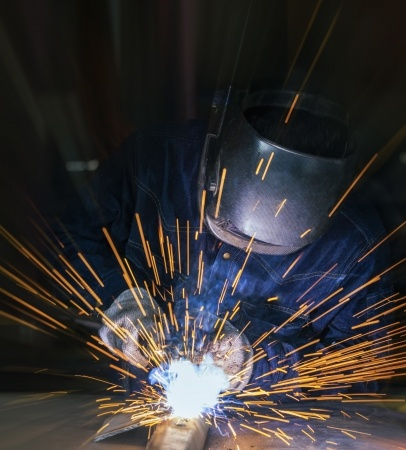Welding is a commonly used practice of joining metals together with extreme heat. The metals are fused, or melted together, and once complete, the process renders a joint that is as strong or stronger than the previously separate pieces.
The process is a common one, but when the proper precautions aren’t taken, it can also be a dangerous one. If you ever find yourself with a welder in-hand, remember these crucial safety tips from Bay Industrial.
- Always, always, ALWAYS wear a proper face shield.
- Never, never, NEVER wear open-toed shoes.
- Always wear a long-sleeved, non-flammable shirt.
- Never weld on or near surfaces that have been cleaned with a chlorinated hydrocarbon (think brake cleaner). When combined with UV light, this substance turns into phosgene gas, which is incredibly toxic and may cause death.
- Protect your ears. A spark that flies into your ear canal could puncture your eardrum, and a spark-punctured ear drum will never heal.
- Clear the welding area of all flammable materials (liquid, paper, etc.), and never wear clothing that may have been exposed to such flammable liquids.
- Be wary of electrocution hazards. Before starting up the welder, make sure the work surface and the floor nearby are dry. The welder itself should also be dry, including the main box, the torch, the pedal, and the plug.
- Even after you’ve finished the welding process, the metal will stay hot for several minutes. In the case of most metals, the heat will be contained to the immediate area around the new joints, but when other, more conductive metals (like copper and aluminum) are welded, the heat will radiate throughout the piece.
- Wear gloves at all times when handling recently welded material. White cotton welding gloves are suitable for TIG welding, but deerskin or heavier duty welding gloves should be used to heavier duty welding.
- Metal burns are one thing, but UV burns are another. The light emitted from a weld arc is, in fact, brighter than the light from the sun (only because it’s closer). Don a full-faced welding mask before looking at the arc, and always make sure proper weld curtains are hung and in place — to protect the welders and any other people in the shop.
- When welding with compressed gas, the inherent danger comes from improperly stored tanks. Tanks should always remain upright, and should not ever be stored horizontally. Tanks should be secured to the shop floor so that it will never fall over, and should be securely capped.

